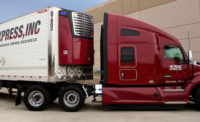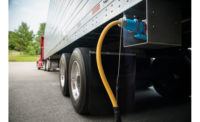In today’s retail grocery marketplace, refrigerated and frozen food distributors continue to face challenges that threaten to increase fleet operating, maintenance costs and consumer food prices.
In short, conventional diesel-based refrigeration systems boast total costs that now exceed renewable power systems. That’s because diesel fuel remains costly, and emissions and noise generated by diesel engines are undesirable and subject to increasing government regulations. Diesel-driven refrigeration units also have higher maintenance costs than most alternatives.
Although a diesel-driven transport refrigeration unit (TRU) is powered by a small diesel engine, it typically produces NOX emissions almost 10 times greater and PM2.5 emissions over 20 times greater than today’s heavy-duty truck engines. This is because Class-8 truck engines use advanced after-treatment systems like selective catalytic reduction (SCR) to meet strict emissions regulations.
Some TRU manufacturers meet new emissions regulations by switching to smaller diesel engines (<25 hp) currently not regulated. While more efficient, these smaller TRU diesel engines don’t do much to reduce the emissions of NOX, particulate matter or ROG/VOCs. In addition, noise pollution created by TRUs operating when delivery trucks are parked or making deliveries present environmental issues, especially in urban settings. Consequently, fleet owners and operators are seeking improvements in fuel use, environmental performance and productivity without compromising food product safety.
What is needed is a next-generation refrigeration system for medium- and heavy-duty commercial vehicles that eliminates diesel-driven refrigeration systems currently mounted high on the front of refrigerated trailers.
Described as an all-electric, solar-based solution, these commercial vehicles offer a full 12-hour route duration without using either the truck engine or a reefer engine to supply power to the reefer unit. The system maintains a constant temperature (within approximately +/- 5°F) during long-duration deliveries and on routes with as many as 10-20 daily door openings for deliveries. And, on occasions when the delivery truck is out of service, it can be connected to shore power at a distribution center (DC).
Currently, this solar-electric refrigeration system is designed for single, medium-temperature refrigeration applications such as dairy and produce, as well as frozen food applications such as poultry. Auxiliary batteries are initially “charged” from utility power that is delivered to the vehicle when plugged in at its “home base” or DC overnight. When the truck leaves the DC on its delivery route, electrical power is provided by thin, lightweight, roof-mounted solar photovoltaic (PV) panels connected to a high-capacity auxiliary battery system that uses the latest power storage technology. The battery system is designed to be charged exclusively by solar and utility power, but the vehicle electrical system is also capable of charging the auxiliary batteries when the vehicle’s engine is operating.
Solar energy captured by specially-designed PV panels provides a completely silent, emission-free source of renewable energy to re-charge the refrigeration unit’s auxiliary battery system. Here, the laminated, semi-flexible PV panels adhere to a straight-truck or trailer roof capture sunlight (even on cloudy days) and convert it to direct current. The electricity goes to a solar charge controller, which maximizes the power output of the PV panels and efficiently charges the auxiliary battery system. The use of solar typically supplies more than 33% of the energy to run the refrigeration allowing the battery to be smaller and the route duration to be longer.
In summary, mobile solar applications for commercial transportation help fleet managers reduce their operating and maintenance costs, extend battery life, reduce downtime and road service and reduce engine idling, diesel fuel consumption and engine maintenance.
During the next decade, expect to see the food distribution industry convert to silent, diesel-free, solar-electric TRUs for a positive economic and environmental impact.



